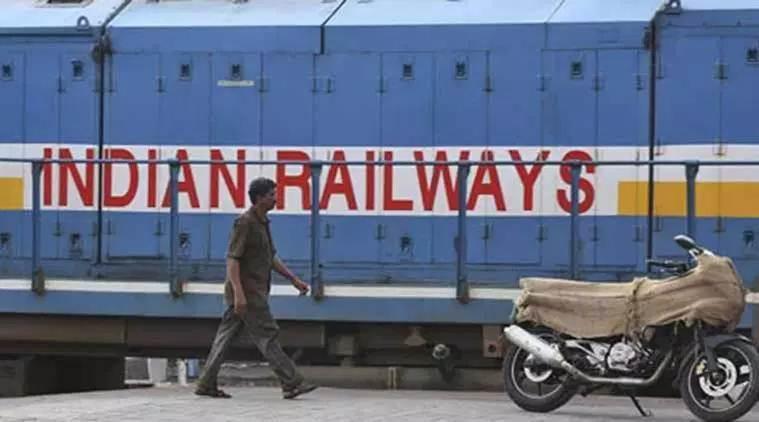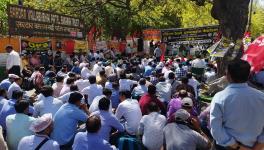Dept Merger to Private Trains: 2019 a Crisis Year for Railways

New Delhi: The year 2019 was a tumultuous year, with the second term of the Modi government paving way for privatisation of several public sector undertakings. The year proved very significant for the Indian Railways as well – from the merger of all departments in the Indian Railways into one to do away with departmentalism to several other changes that will have a far reaching impact on rail functioning.
As NewsClick had reported earlier, the cadre merger was proposed on December 23 and the Union Cabinet presided by Prime Minister Narendra Modi had approved the proposal on December 24.
Another major takeaway for the Railways this year has been the paving of road for private train operation and corporatisation of rail production units, despite strong opposition. The launching of the Lucknow Tejas Express by the Railways subsidiary Indian Railway Catering and Tourism Corporation (IRCTC), is the first step towards privatisation of train operation.
The year 2019 also saw the formation of Group of Secretaries as an empowered group to expedite the private train operation project which envisage running 150 trains by private players and also the station redevelopment scheme aiming involvement of major real estate players, which has been going on for the past several years without much success.
Not only that, the largest employer also witnessed the downsizing of huge workforce of the national transporter including the overgrown Railway Board, a move considered to be a major reform agenda. With the dwindling freight and passenger earnings, the revenue shortfall has crossed over Rs 20,000 crore as against the expected growth in 2019 much to the chagrin of the railway authorities.
Also read: 150 Trains Worth Over Rs 22,000 Crore up for Grabs by Private Players
There were 49 consequential train accidents, four more than the previous year including eight fire incidents. While eight fire cases in a year is definitely a cause of worry, Railways, however, maintain that the cause of the repeated fire has been rectified to prevent further such incidents. Though railways safety data do not mention of any human casualty in the year so far, people continue to lose their lives in the tracks of Mumbai suburban service and the public transporter has been finding it difficult to address the issue.
Even though, the number of deaths due to falling off from the trains and crossing rail lines in Mumbai suburban section have come down as compared with 2018, the continuing deaths are a grim reminder of the sad reality of the overcrowded service.
The Railways, however, did achieve the complete elimination of unmanned level crossings on the broad gauge network in the country in 2019. This move has been seen as a big achievement as these unmanned crossings were virtual death traps and were a major cause of train mishaps. But, it should be noted that even manned level crossings have also witnessed mishaps during the year. In order to achieve zero accident rate, the Railways has decided to eliminate manned crossing by constructing road overbridge and road underbridge.
Moreover, the over 3000 km long Dedicated Freight Corridor (DFC), a flagship project of the Indian Railways, will have no level crossing on its entire stretch to ensure uninterrupted movement of goods train. The year witnessed the opening of 306 km of Western DFC between Madar and Rewari for trial-run which will pave the way for running freight trains at maximum speed of 100 km per hour in the section.
Also read: To Stave Off Turf War, Railways to Create Two Corporate Giants, Not One
While the much-delayed DFC project is off the ground with opening of some sections for commercial trial in 2019, the Mumbai-Ahmedabad High Speed rail project is not moving as expected. The land issues for the Rs 1 lakh crore bullet train project, another mega project of railways, is still a major cause of delay, and the change of government in Maharashtra this year has adding to the problem.
The year will also be remembered for launching of Vande Bharat Express, the first indigenously built Trainset, with upgraded amenities and enhanced speed in the country. However, the Vande Bharat trainset led to a serious turf war between Mechanical and Electrical departments of the Railways resulting in vigilance probe against the people involved in its making. Among others, the bitter turf war between traditional rivals Electrical and Mechanical wings, is a strong reason to merge all departments into one.
The CCTV tender by RailTel was floated for the seventh time after discharging it six times in the past in 2019. But, RailTel, a public sector undertaking (PSU) under the Railways, drew a blank on demand tender as no significant player showed interest in the project to provide entertainment programme on screens behind the seat on the moving trains.
Another significant improvement was that the Railways made good progress in the year in providing free WiFi service at about 5,000 stations across the country. Meanwhile, rail properties worth Rs 90 crore were also damaged due to the agitation against the Citizenship Amendment Act.
Also read: Indian Railways Crawls on Slow Lane Amid Economic Slump
Get the latest reports & analysis with people's perspective on Protests, movements & deep analytical videos, discussions of the current affairs in your Telegram app. Subscribe to NewsClick's Telegram channel & get Real-Time updates on stories, as they get published on our website.
























